NVIDIA’s GeForce GTS 450: Pushing Fermi In To The Mainstream
by Ryan Smith on September 13, 2010 12:02 AM EST- Posted in
- NVIDIA
- Fermi
- GeForce GTS 450
- GF106
- GPUs
Overclocking
As we alluded to in the opening of this article, NVIDIA is once again pushing the overclockability of their GPUs. The GF106 GPU at the heart of the GTS 450 is supposed to be about as overclockable as the GF104 GPU instead the GTX 460, and there’s little doubt that this is the case. NVIDIA’s partners are already on the bandwagon, and are offering heavily overclocked cards. Or for the do-it-yourself types, even the average reference card should be quite overclockable as long as you’re willing to take the risk of the periodic dud.
The GTS 450 is already supported by the latest version of MSI’s excellent afterburner software, and keeping with their policy MSI has enabled overvoltage support for all cards using the same VRMs as the reference card. So we were able to overvolt all of our reference cards and our factory overclocked cards. The VRMs on all of the cards except the Asus card top out at 1.162v, however for safety reasons (and the fact that the VRMs aren’t even passively cooled) we limited ourselves to 1.15v.
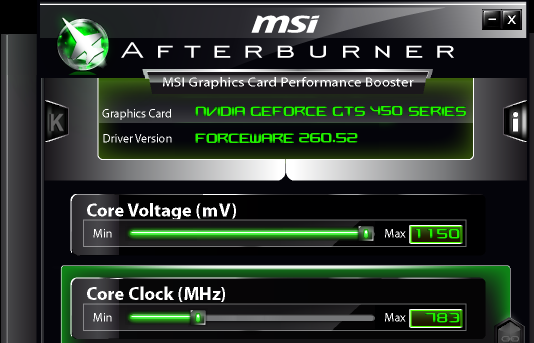
As not all of our cards are exactly alike, we’ll quickly run down the differences between the various cards
- 2x NVIDIA GTS 450 Reference
- 1x Calibre X450G. Reference PCB, aftermarker cooler, factory overclocked
- 1x EVGA GTS 450 FTW. Reference PCB, reference cooler, factory overclocked
- 1x Asus ENGTS450 TOP. Reference-derived PCB, custom cooler, factory overclocked
- 1x Palit GeForce GTS 450 Sonic Platinum. Custom PCB, custom cooler, factory overclocked
| Overclocking Results | ||||||
| Stock Clock | Max Overclock | Stock Voltage | Overclocked Voltage | |||
| GTS 450 Reference #1 | 783MHz | 955MHz | 1.05v | 1.115v | ||
| GTS 450 Reference #2 | 783MHz | 930MHz | 1.062v | 1.115v | ||
| Asus ENGTS450 Top | 925MHz | 985MHz | 1.125v | 1.115v | ||
| EVGA GTS 450 FTW | 920MHz | 955MHz | 1.112v | 1.115v | ||
| Palit GTS 450 Sonic Platinum | 930MHz | 985MHz | 1.087v | 1.115v | ||
| Sparkle Calibre X450G | 850MHz | 935MHz | 1.087v | 1.115v | ||
Unlike the GTX 460 launch where the vendor cards we had all came with a mild factory overclock, for the GTS 450 launch all of our cards have a significant factory overclock. 3 of the 4 are at 920MHz or better, which is a 137MHz (17%) overclock over reference speeds.
Even with voltage tweaking capabilities there was a very noticeable range in the overclockability of our cards. The worst card was one of the reference cards, which only hit 930MHz even at 1.15v. The best cards were the Asus and Palit cards at 985MHz. This puts the average overclock at just over 955MHz, which isn’t too far off from the factory overclocks already on some of these cards.
Meanwhile 4.2GHz seems to be the wall for memory overclocking. The GTS 450 is only equipped with 4GHZ GDDR5, so this may not be a fantastic outcome but it is realistic.
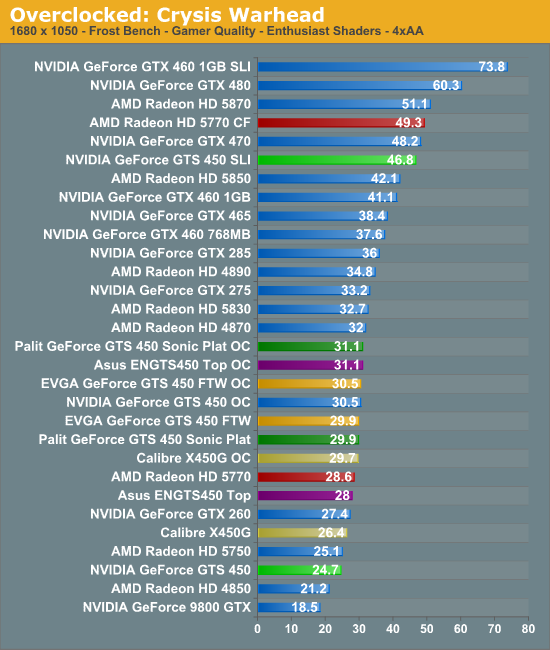
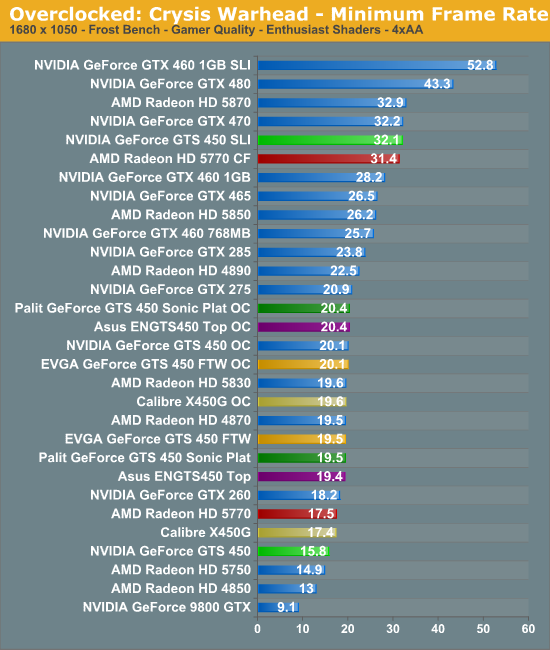
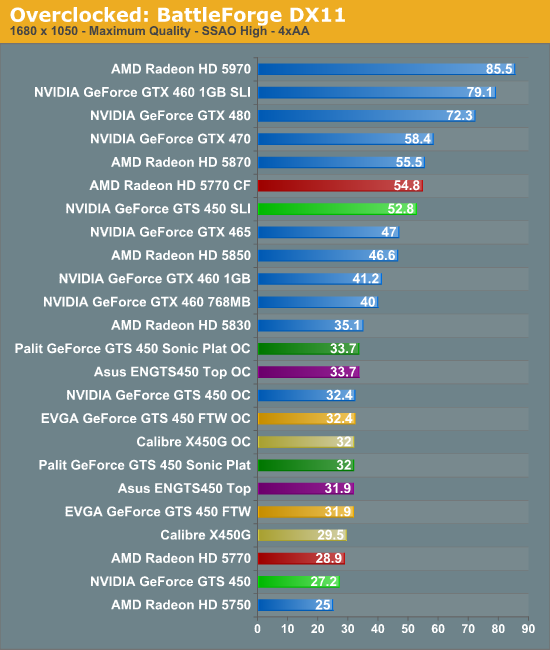
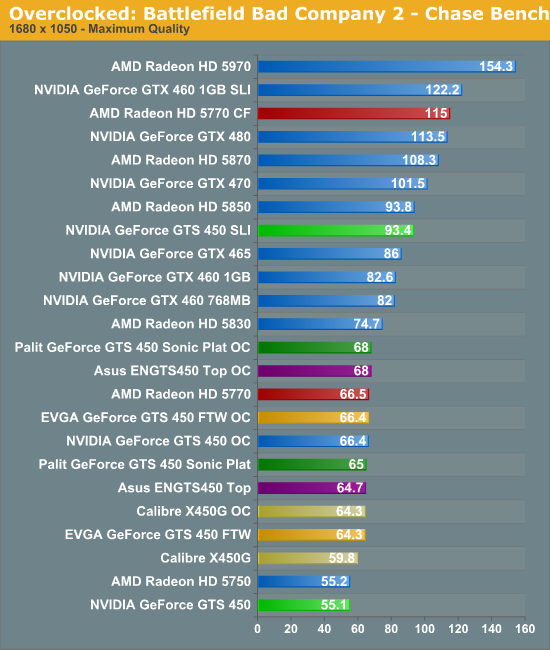
Because our maximum overclocks weren’t too much higher than the factory overclocks on some of these cards, there aren’t many surprises to be had when it comes to overclocking. With a solid overclock you can beat the 5770 most of the time, but it’s not enough to get much higher than that.
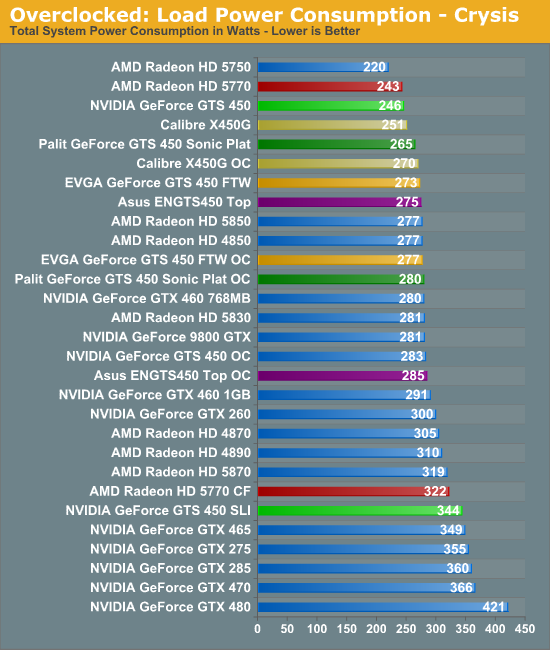
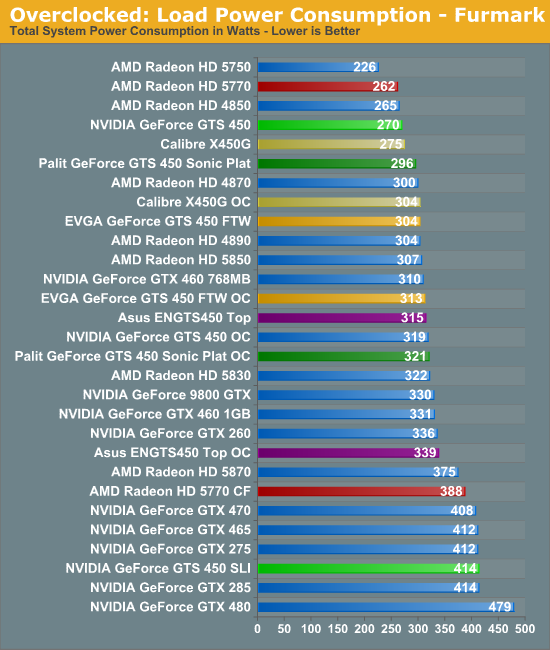
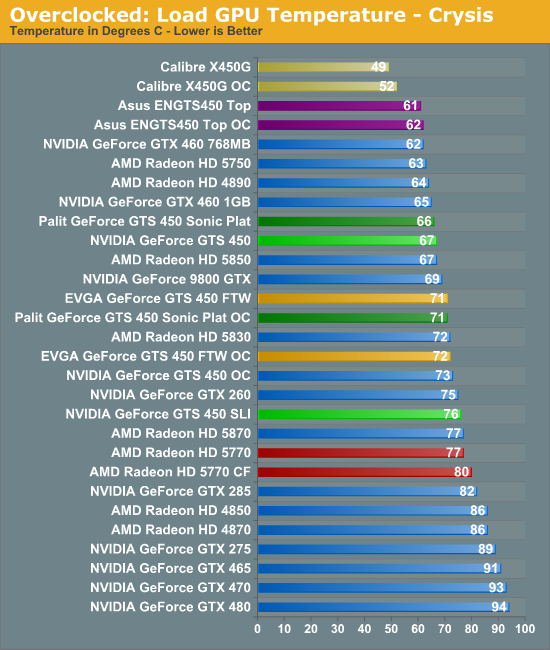
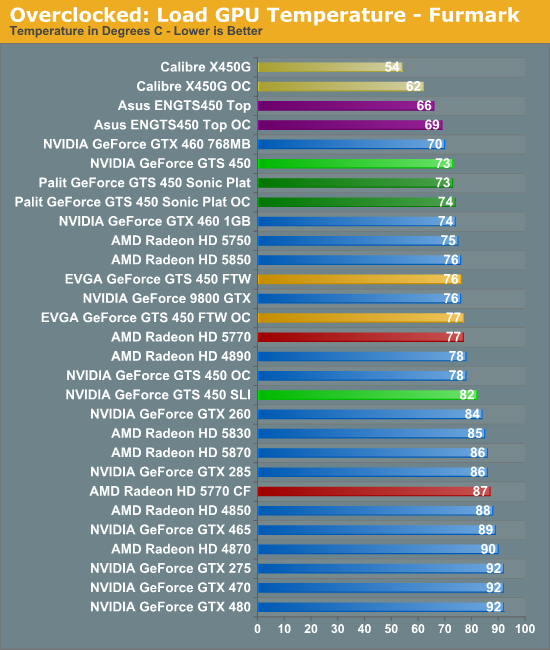
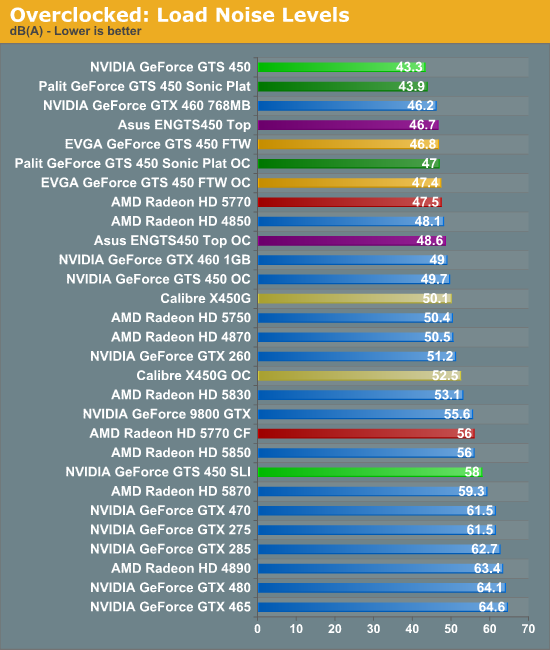
Overclocking (or rather overvolting) has the usual outcome when we look at power, temperature, and noise. The extra power enables extra performance, but it completely blows the performance-per-watt of the GTS 450 cards. Temperature and noise levels rise, but both are actually still quite manageable even at 1.15v. The only things holding the GPU back are the VRMs feeding it, and the innate limits of what the GPU can reach. Given this, it makes little sense not to overclock as long as you have a card with a suitable limit.
Finally, as a testament to how poorly a pair of GTS 450s in SLI get along with each other when they’re right next to each other, we weren’t able to get away with overvolting them at all. Even at 1.1v, the covered card would ultimately reach a thermal runaway under FurMark – the fan would max out and the temperature would start climbing in to the 90s. This shouldn’t be an issue with cards that are separated, but overclocking is definitely not on the menu when they’re packed together.










66 Comments
View All Comments
FragKrag - Monday, September 13, 2010 - link
Why isn't there a SC2 bench? :(I saw them on the laptop reviews and expected them here :(((((
Ryan Smith - Monday, September 13, 2010 - link
Because of the vast number of cards in our library, we only refresh the GPU test suite twice a year. It will get refreshed later this fall, and SC2 is a very likely candidate.Gomez Addams - Sunday, September 19, 2010 - link
When you do your refresh please include older cards like the GTX285 and those of its era. I find it helpful to be able to evaluate whether a video card update will be of any value. So far, it would be of very little value.ronnybrendel - Monday, September 13, 2010 - link
http://www.legitreviews.com/article/1408/11/eanazag - Monday, September 13, 2010 - link
Regretfully, I am patiently waiting for the test suite refresh.Leyawiin - Monday, September 13, 2010 - link
Prior to Newegg pulling them there were lower priced ones at $130 going up to $140. Its true if you play the rebate game you can get an HD 5770 at that price, but what's coming out of your pocket on the day you buy is generally $140-150. HD 5750s are sitting at $120-140. GTX 460 768MBs are down to $170 (no rebate) so the pressure seems to be on the Radeons as much as the GTS 450. The HD 5750 is almost a useless purchase when the others are clustered so closely to its price point.iwodo - Monday, September 13, 2010 - link
It is too bad that we wont get a 28nm die shrink of the Fermi soon. But it seems the logical plan for Nvidia is to work on Frequency and Bandwidth.You mention Nvidia has a relatively poor Memory Controller for GDDR5 and that is why it had to use 384bit MC where 256 from a ATI design would be enough.
It we get a MC upgrade, + some better Frequency Headroom, and unlock the last bit of the SP, Nvidia should be able to counter the Northen Island coming in 2 - 3 months time.
As that would be the best we can get with 40nm limit and respin of Fermi.
DMisner - Monday, September 13, 2010 - link
How does the 450 stand up to the 250 in power consumption and general gaming performance.Also, any word on how many PPD the GTS 450 will get in Folding@Home?
lecaf - Monday, September 13, 2010 - link
heyin all these benchmarks the 450 beats the 460 is that right ?
I've took a look at tomshardware review and there the 460 wins.
Did I miss-look at something or the figures are wrong?
Ryan Smith - Monday, September 13, 2010 - link
Where are you seeing the GTS 450 beating the GTX 460?